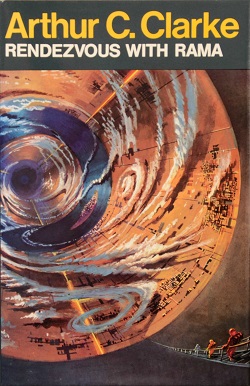After 19 Hugo Award winning novels, I am finally reviewing
the last of the “Big Three” of science fiction: Arthur C. Clarke. Clarke is
most famous for 2001: A Space Odyssey which
strangely did not win the Hugo when it was published in 1968. It wasn’t even
nominated. Even though he casts a large
shadow over science fiction, I had not read a single work (not even a short
story) by Clarke until I came to 1974’s Rendezvous with Rama. I am sorry it
took this long because Rendezvous with Rama is fantastic and, so far, tied with
Hand of Darkness as my favorite Hugo
Winner of the 70s.
Rendezvous with Rama is a strange book
to find so engrossing because there is no real conflict. There is a small
conflict with colonists from Mercury but it doesn’t drive the plot for the most
part and doesn’t feel that important. Instead of conflict, Rendezvous with Rama gives the reader the thrill of discovery. This
is a book about the joys of exploration on a new and foreign land.
This
new and foreign land is not another planet but a large asteroid-like space
craft that appears in our solar system in 2130. Named Rama by human
authorities, the space craft is perfect cylinder measuring 34 miles long and 12
miles in diameter. A space ship is sent to intercept the craft before it rounds
the sun and travels outside of the system. The team, led by Captain Bill
Norton, lands on Rama and begins to explore.
There
really isn’t too much else I can say about the novel. To tell too much would
ruin the sense of discovery Rendezvous with Rama imparts. Clarke slowly reveals
more and more about the spaceship and leaves just as many questions as answers
by the time the crew is forced to depart. The little pieces of the book’s
universe are revealed through the crew members but exploration is the heart and
soul of the novel.
Clarke
was a physicist so it is no surprise that Rendezvous
with Rama is hard SF. Hard SF is a type of science fiction that strives for
scientific rigor. It is like comparing 2001
to Star Wars. The crew is scientists
(the stereotypical characters of hard SF) and they try to understand and
explain how Rama works. Rather than take away from the sense of wonder that
runs through the book, the scientific detail enhances it. These details create a feeling of awe at the
immensity of the craft and its complex workings.
Sadly, Rendezvous with Rama ends just as a
number of fascinating discoveries are being made. The book ends with a teaser
that other Rama-like craft are on their way but it is just that, a teaser.
There are sequels but they are written by a man named Gentry Lee and they are
supposed to be terrible. From what a friend told me and what I read on
Wikipedia, the sequels lose the sense of wonder and awe and replace it with bad
plotting and excessive sex.
If you
enjoy a tale of wonder and discovery, Rendezvous with Rama will not leave you
disappointed. I loved it and it makes me excited to read other works by Arthur
C. Clarke. He has an impressive bibliography so I am sure there are other gems
to discover.
Next
time I will take a look at another Ursula LeGuin work, The Dispossessed. Her last Hugo Winner was great so I have high hopes for this one.
